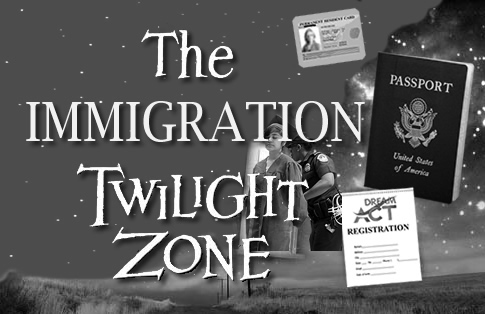
As a deportation defense lawyer, some days, you just don’t get any respect.
Especially from short-sighted allies.
A young woman, in her early 20s, walked into my office to talk about the DREAM Act. She had heard the news about Obama’s newest immigration proposal.
It reminded her about a meeting we had two years ago, when I told her about the DREAM Act as a possible solution for her immigration situation and to keep her eye out for it in the future, closer to the election.
Her optimism was blind.
When I told her that the current DREAM Act deferred prosecution proposal was not the real DREAM Act, she became upset. Not at the news, but at me.
“I’m still going to apply. I’m tired of waiting. I need to work legally to support myself. So I don’t care what you say.”
After she left, I returned to my computer and saw a new email message. It was from an immigration lawyer in San Diego. He also disagreed with my position.
He was planning to submit deferred action applications.
I had an ongoing dispute with him, going back to the Friday of Obama’s announcement, over what I consider a misguided strategy.
Deferred action, at present, is a dead-end, which does not offer young immigrants a path to lawful permanent residency. And the risk of deportation, for many would-be applicants, is all too real.
I wrote back. I called his stance professionally irresponsible.
When The Best Immigration Offense Is A Good Immigration Defense
I’ll admit there are some situations where going forward might be necessary.
For example, for someone in removal proceedings, I recommend using the DREAM Act defensively to prevent deportation. Preserve the battle for another day . . . when immigration laws might be friendlier.
Here’s another possibility.
Use the deferred prosecution policy as a back-up to an I-601 waiver.
Deferred Action For DREAMers
According to DHS Secretary Napolitano’s June 15, 2012 memorandum, immigrants must prove the following to be considered for deferred action:
- They must have arrived in the U.S. when they were under the age of sixteen;
- They must have continuously resided in the U.S. for at least five years prior to June 15, 2012 and have been present in the U.S. on June 15, 2012;
- They must be currently in school, have graduated from high school, have a GED, or be an honorably discharged veteran of the U.S. Coast Guard or the U.S. Armed Forces;
- They must not have been convicted of a felony offense, a “significant misdemeanor offense,” three or more non-significant misdemeanors, or otherwise pose a threat to national security or public safety; and
- They must have been under thirty-one years old on June 15, 2012.
Under the DREAM Act, many deserving applicants would become green card holders.
To be sure, I’m no fan of the current provisional I-601 proposal.
I fear, as a Riverside immigration attorney, ICE might decide to use an immigrant’s data if the I-601 is denied against him or her.
Time will tell. Yet, it’s already been seven months since this proposal was launched by the Obama administration. And we’re still in the dark.
Suppose they knock on your door and say it’s time for your spouse to leave?
Well, if this nightmare becomes reality, and your spouse was under 30 on June 15, 2012, perhaps you can use the DREAM Act prosecutorial discretion to get two years of protection against removal.
Of course, if nothing happens by the end of the two-year deferred prosecutorial period, you’re back where you started.
In the cold, cold grip of ICE.
So why use such a dead end process affirmatively?
Not me.
Not now.
Perhaps not ever.
I’ll stick to playing hard-nosed defense.
Without more safeguards, those who affirmatively file for deferred action risk the possibility of entering the twilight zone – a place where immigrants’ dreams are subtly twisted into their worse nightmares.
The Immigration Twilight Zone

Imagine Rob Serling describing contemporary immigration politics.
“You are about to enter another dimension, a dimension not of logic and reason, but of manipulation. A journey into the wondrous land of immigration reform. Next stop, the Immigration Twilight Zone.”
I’ll begin our journey into the Immigration Twilight Zone with some points touched on by others, and then move to concerns not quite as obvious to many immigrants and immigrant advocates.
What Happens At The End Of The Two Year Period?
There are no guarantees deferred action for DREAMers will be renewed at the end of two years.
In fact, there are no guarantees the program will even last two years. The president, if reelected, or his successor, could terminate deferred prosecution for immigrant youth at any time.
Who Decides The Fate Of Your Request? How Much Evidence Must You Submit?
The majority of applications will be reviewed by the U.S. Citizenship and Immigration Services (USCIS), which is generally, but not always, kinder, gentler, and wiser than counterparts in other immigration agencies like the Customs and Border Protection (CBP) and Immigration and Customs Enforcement (ICE).
Officers’ decisions are discretionary.
To date, I have not found information on the standard of proof immigrants will need to meet. In other words, when immigrants file their documents, will agents require evidence that proves immigrants’ cases by a preponderance of the evidence (51%) test, a clear and convincing (70%) test, a beyond reasonable doubt (98%) test, or somewhere in between?
Given such wide discretion, how will problems, like those which arose during the 1980s legalization program involving the turning away of qualified immigrants based on misperceived technicalities, be prevented?
Is There A Cut-Off Date For The Educational Requirements?
To qualify for deferred prosecution, the proposal states individuals must be currently in school or have graduated from high school or have obtained a GED, or are honorably discharged veterans of the Armed Forces or Coast Guard.
What happens to the immigrant youth who meets all the other criteria but has not completed high school?
Suppose a young immigrant female had to drop out of school due to pregnancy. Now 25, she is picked up by ICE as having entered the U.S. without inspection. Will she be allowed to start GED classes to fulfill this final requirement?
Or is she precluded from being granted deferred prosecution?
How Will Short Breaks Affect The Five Year Residency Requirement?
The current proposal states an individual must demonstrate that he or she has resided in the U.S. for at least five years preceding June 15, 2012. The government has noted that brief and innocent absences undertaken for humanitarian purposes will not violate this requirement.
What constitutes a brief absence? One week, two weeks, a month?
What is an innocent absence undertaken for a humanitarian purpose?
Does a death to a family member qualify? How about a pending death, which is followed by a recovery, or a serious surgery? Appearance at a court hearing to offer testimony? A family vacation?
Will the period of absence be subtracted from the five-year total?
If a person left the country for 21 days, but they were here, as of June 15, 2012, for five years and 10 days, will that individual be disqualified?
The Expanded Scope Of Criminal Exclusions To Eligibility
To be eligible for deferred prosecution, an applicant must have not been convicted of a felony, “a significant misdemeanor offense, multiple misdemeanors, or otherwise present a threat to national security or public safety.”

A felony is any crime that can be punished by more than one year in prison.
That’s easy to understand.
But what is a significant misdemeanor?
This is a new term. It is not defined.
According to DHS, a significant misdemeanor includes any federal, state, or local criminal offense punishable by up to one year of imprisonment or even no imprisonment.
DHS has given examples of offenses that it considers as significant misdemeanors: offenses involving violence, threats, or assault, including domestic violence; sexual abuse or exploitation; burglary, larceny or fraud; driving under the influence of alcohol or drugs; obstruction of justice or bribery; unlawful flight from arrest, prosecution, or the scene of an accident; unlawful possession or use of a firearm; drug distribution or trafficking; and unlawful possession of drugs.
This broadly-worded list opens potential traps for immigrants who have committed various minor offenses.
Moreover, this list exceeds the list of crimes which currently make an immigrant deportable or inadmissible under “aggravated felony” rules.
The danger here seems obvious.
You apply for benefits. The crime you have committed does not count against you as an aggravated felony in terms of deportability. But based on this crime, you application is denied.
You are now identified as a person who entered the U.S. without permission. Will this get you placed into immigration court proceedings to be removed from the United States?
In addition, three non-significant misdemeanors will disqualify you from deferred action.
What is a non-significant misdemeanor?
Are You A Threat To Public Safety Or National Security?
Consider this scenario.
You might not have ever been convicted of any offenses. Yet, in the government’s view, since you have multiple arrests, you could still be deemed ineligible as a threat to public safety.
It’s a matter of discretion.
Will former teenage members of gangs be considered a danger to the community 10-15 years after they renounced their membership and established deep family and community ties?
Or will those with ties to individuals, whom the government “suspects” have relationships with terrorist organizations, be disqualified on such third party grounds?
What Happens If Your Request Is Denied?
If you are denied, there is no appeal.
For immigrants whose requests are denied, USCIS will apply its “existing policies regarding referral of cases” to ICE and immigration court.
What happens if an immigrant applies for deferred prosecution, but fails due to a technical matter, like failing to meet the five year requirement by five days?
Will he or she be placed in proceedings to face deportation charges?
Immigration Dream Or Immigration Nightmare?
You entered the U.S. as a young child with no input in your parents’ decision.
You’ve lived here nearly your entire life. You know no other home. You do not speak, or are not fluent, in the language of your ancestors.
You apply for protection against removal under the DREAM Act deferred prosecution policy.
Your application is reviewed by an officer, in his or her discretion.
The amount of evidence you need to submit is not defined.
Your application is denied, and you have no right to appeal.
Or your application is approved, and a few years later, the program is terminated.
You are sent to immigration court to face deportation charges.
Welcome to the immigration twilight zone.
By Carlos Batara, Immigration Law, Policy, And Politics




